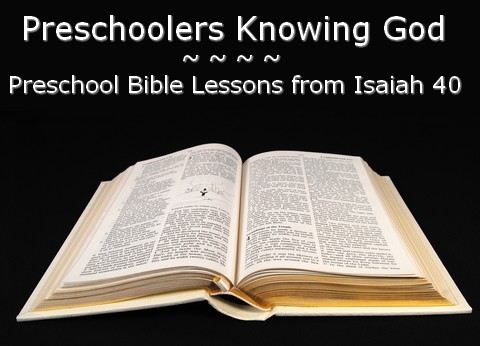
Series Index:
- Lesson One: God’s Word is Eternal
- Lesson Two: God is Our Shepherd
- Lesson Three: Our God is Mighty
- Lesson Four: Our God of Wisdom
- Lesson Five: There is No One Like God
- Lesson Six: God’s Strength is Everlasting
What’s Next? After this series, you should consider teaching “Preschoolers Knowing Jesus” which is the follow-up to this material.
Series Introduction:
This series of Bible lessons for preschoolers will cover Isaiah 40. My goal is for preschoolers (4 and 5 year olds, the lesson is too abstract for 2 and 3 year olds) to come to know God in greater measures through these verses. In my experience with teaching and critiquing children’s curriculum, I have been greatly disappointed in the approach taken to preschoolers. Their cognitive level is indeed lower than older children. However, this does not mean biblical stories should be taken out of context in order to teach simple moral lessons (God wants us to share; God wants us to listen; God wants us to be kind, etc.)
Our goal as ministers and teachers should not be for children to hear Bible stories and learn these truths. Instead, it should be for children to know and experience the God of the universe, the God we have forsaken our lives for in service to Him. I challenge you to believe that preschoolers have a high level of spirituality, and because of this, they can learn deep truths about God in spite of their cognitive level. We can use the truths about their cognitive level to aid in lesson planning, but it should not limit what God can show them through His word.
In order to teach with this in mind, I encourage you to study and pray through the verses taught each week. God has a purpose for each verse of Scripture. I desire to be true to the Scripture as much as possible and teach them what God intended to be gleaned from the verses, not what I believe preschoolers can understand. The Exegetical Idea at the beginning of each lesson summarizes what the passage meant to those it was written to in biblical times. The Pedagogical Idea summarizes what this passage means to us here and now. After studying the verses, incorporate what you have personally experienced with God in the particular lesson you are teaching. Strive to help them experience wonder and awe at our great God.
As teachers, we have a responsibility to nurture children’s faith in such a way that it becomes an integral part of their lives. My goal is not primarily for the children to learn moral laws and ways to live, but to know God intimately. We are setting the foundations of the knowledge of God in children, and this foundation can be firm or shaky.
Each lesson consists of four steps. Step one, Kindle Curiosity, is a time to spark interest and catch the children’s attention to an aspect of God or an illustration of the lesson. Step two, God revealed, is a time to dive into Scripture to discover God. Step three, Personal Pursuit, brings out why this Scripture is important in our lives, and more specifically, in the lives of the children. Step four, Daily Knowing, helps the lesson go one step further, striving to send God’s word with the children as they leave the classroom. This first lesson may not go over so well, since preschoolers are so used to simple moral lessons. However, I believe that repetition of this style of teaching will allow the children to grow in their ability to comprehend and experience deep truth from the Bible.

Thank you SO much for these awesome lessons! It is good quality material and I appreciate how it is laid out with precisely what to say to the children and what materials are needed to teach the lesson. I like to see lessons that will help children know more about God and Jesus, not just the “stories”. Thanks again!!! 🙂
So glad I’ve found this website. I am starting preschool with my 3 yr old, (will be 4yrs in a few more weeks), and I want to incorporate Bible teaching. I just didn’t know how to do it on his level. This is perfect! I also wanted to teach him a good bit about who God is first, and not just start with Adam and Eve. Then I found this. I will be starting with this series tomorrow. Thanks so so so much!!! God bless!!